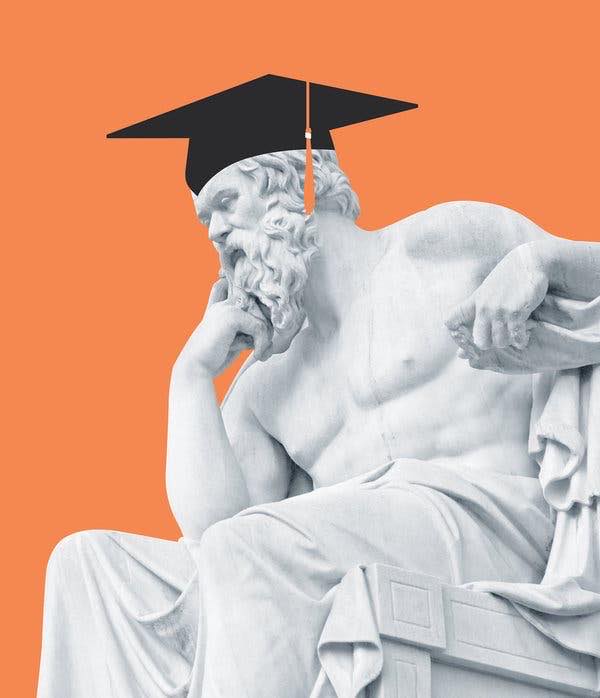Ben Wiseman, photograph by Hiroshi Higuchi/Photolibrary, via Getty Images
The inherent stigma in liberal arts education and the language we use to talk about it
Chiara Greco, News Editor
While the prospect of university and higher education promises many job security for the future, this idealization of what can be referred to as a safety net future can seem bleak or perhaps daunting for most — especially those studying the Arts. But why is it that self doubt seems to be a requirement for obtaining a degree in the humanities?
With the ever-shifting landscape of higher education, the question of the value of a liberal arts degree continues to be raised. In 2018, The Atlantic wrote an article entitled “The Humanities Are in Crisis,” which discussed the reasons behind students abandoning humanities majors for the apparent promise of yielding better job offers through other degrees. This idea that liberal arts education does not allow students to find a pathway toward creditable and well-paying jobs seems to be based on the assumption that knowledge from a humanities degree is non-transferable or marketable. It is quite the opposite. Just because one studies poetry does not mean reading poetry is their only job-applicable skill. While recent statistics do show relevant drops in students choosing to obtain a humanities degree, the knowledge acquired from said degrees is extremely worthwhile and job-enriching. To be clear, I am not trying to advertise for everyone to study the humanities. Rather, I wish to point to a certain lack of awareness from the general public and media by assessing the stereotypes and language used to discuss liberal arts education.
The stereotype of “worthless” humanities degrees has been around for decades. Though in the digital and technologized age, these stereotypes have been ever-growing and persistent. As many articles point out, the real problem with liberal arts education is the stereotypes themselves. Now, while it’s hard to pinpoint an exact time as to when this skepticism surrounding liberal arts degrees began, it has been around for quite some time. Most sources have traced this idea of “jobless” humanities degrees to the Great Recession in the United States. After the 2008 financial crash, prestigious liberal arts schools saw major declines in students choosing to study History, English, Sociology, and so on. However, it seems fair to point out that, at this time, there was next to no promises for jobs no matter what you studied. While this decline in liberal arts majors can be related to economic struggles, to place the blame solely on the economy seems to prove the exact point I’m arguing against. The economy does have an influence, but even more so does popular culture. So why is it that these mentioned degrees still get pushed to the side with skepticism? Let’s paint a picture. Imagine you’re a student who has gone home for the break, you have finally decided to major in the humanities. You are met with the sudden barrage of questions: “What are you going to do with that?” “So you want to be a teacher?” “I guess that means you’ve got a lot more school ahead of you”. “So you’re choosing passion over pay?” “You know you’ll probably just end up as a barista.” In all fairness, while most students, regardless of major, are met with questioning, there seems to be something different attributed to those in the liberal arts stream — most notably the “why” of choosing their path.
Take for example the public’s conception of an English major. From this standpoint, all students studying English want to be teachers, or they accidentally fell into the major because they couldn’t decide on anything, will end up serving you coffee, and are only doing it because it’s easy — all they have to do is read. Even a quick google search of “English major” will lead you to half-witted memes depicting all of these stereotypes which usually end with the question, “What can you do with an English degree?” Well, it’s a degree which emphasizes clear and precise communication, as well as the abilities to deeply read, analyze various texts, form coherent and persuasive arguments from fragments, and critically search for meaning. These don’t sound like useless or unmarketable skills, but the language with which we talk about these skills makes them seem useless.
It seems relevant to say that from a general standpoint, stereotypes are usually associated with misguided views. But could these misguided views go so far as to demolish fields or specialized areas of study? The short, immediate answer to this is no. Though from research done by the National Center for Education, statistics do show that enrolment in a History major dropped by more than 1,500 students between 2016 and 2017. Other statistics show that humanities fields such as English, Sociology, and Philosophy have suffered from the same downward trend after a period of relative stability from 1991 to 2012. Though to counter this, as a 2017 article from the Globe and Mail states, “One Canadian study on earnings among graduates from the University of Ottawa has found students in humanities and social sciences have more career stability.” In fact, it can be argued that public attention to statistics and personal stories about temporarily unemployed liberal arts graduates are driving a false sense of crisis. So, while statistics do show drops, they don’t represent everything, nor should they act as a basis toward choosing what to study.
I myself, a third-year student majoring in Philosophy and English, have questioned my own degree and path plenty of times. But as I said before, it seems arbitrary to argue that only humanities students go through this, as questioning choosing “the right path” is not privy to only those studying the discussed degrees. In saying that, it does seem appropriate to argue that humanities students, in some regard, bear the brunt of this inherent doubt due to what I’ll be referring to as public dismissal, or “bad PR”. This idea of “bad PR” can be explained as misguided representation in the media through the way we label and talk about the humanities. Language such as “in crisis,” “useless,” “worthless,” “lazy,” “unmarketable,” and so on have come to represent the way our culture discusses liberal arts education. In most ways, we seem to disregard the importance and positive aspects of humanities degrees when compared to science or technology degrees. The humanities seem to be represented poorly and devalued through our current language and discussion of them.
In terms of this, it’s fair to point out that there is a whole discourse defending the English major, though the same cannot be said for Computer Science or even Business majors. So, why is it the public’s response to dismiss humanities degrees? Why do students have to look up a “defence” of their degrees to feel self assured? I’m not sure these questions can fully be answered in a definitive way. If anything, they pose more of a problem than a solution. This idea of public dismissal further pushes students away from choosing humanities majors based on the amount of literature out there that is against them. While various articles titled “In Defence of the English Major” may actually be helpful, the very fact that they exist seems to point to an inherent issue within our culture and academia — that is the devaluing of important streams of education.
A student who majored in the Fine Arts commented on this self-doubt and devaluing of liberal arts education, arguing that she did find that there was a stigma in her chosen field of study. “The amount of times you get asked, ‘What can you do with that degree?’ is endless and disheartening.” When asked about her opinions on the stereotyping of these degrees she stated, “I have seen firsthand hopeful artists’ and writers’ dreams get crushed by people with a negative outlook on the arts.” She further laments, “Open houses for art programs are a depressing sight, especially seeing parents crush their own child’s dreams.” In regard to her personal experience she states, “I definitely felt doubt when choosing my degree, mainly because of the competitive nature there is in the arts. Arts degrees are important, just as important as the sciences and could definitely be better represented in the media.”
On the other hand, a student in the STEM (science, technology, engineering, math) field studying Life Sciences commented, “In terms of my chosen degree, I never really doubted it. It was something I had wanted to do for a very long time and something that was heavily encouraged by my parents as well.” He continued, “I remember taking a Philosophy course first year as part of the distribution requirements, and found that it taught me writing and arguing skills, and even debated truths about humanity that I’m fairly certain I would not have been able to learn from my science degree. There’s definitely value in that.” When asked about the stereotypes associated with his degree contrasted with a humanities degree, he stated, “The public perception toward my major is a lot more respected; humanities students get the bad rap of being ‘lazy’ while science students are seen as hard-working, pulling all-nighters. Through hearing from my friends who study humanities I know that this is purely a misconception. Both degrees are difficult, just in different ways.”
This all goes to show that we as a society are very influenced by stigmas and public perception. Much of our influence from these factors can be misguided. In fact, most of these stereotypes are built off the “bad PR” that liberal arts degrees get.
Like most debatable topics, there is a whole other side of the story here. A Ted Talk by Kate Cottle, Chair of Literature and Humanities at Wilmington University, brings up the idea of humanities being pertinent and important to everyone’s lives. Cottle discusses how “critical thinking, communication, global perspective, and literacy skills are all amongst the most important competencies employers look for.” She argues, “Almost every technical skill you learn right now in college is probably going to be obsolete in five years, but literacy and critical thinking skills will last the rest of your life.” For Cottle, the humanities teach you how to think through reading and writing. Liberal arts education brings up this idea of collective knowledge across cultures which contributes to her idea of global perspective. She continues arguing that “we have huge global problems […] and the only way to solve them is as a collective, the way we get access to people’s cultures is by studying their humanities, the humanities is how we understand the collective, how we engage and solve problems through collective knowledge.” This idea of solving problems through critically engaging with the humanities is extremely important to bringing back value to liberal arts education. Some problems can’t be solved with math and science alone.
In regard to this, tech companies such as Apple and Google have recently hired in-house philosophers. While information about the role of these in-house philosophers is limited, the fact that these companies need their expertise points to a value in the education learned from reading philosophy and contemplating on moral and ethical issues (which tech companies will ultimately face). Google and Apple have recognized that they need help in navigating the moral challenges they’ve created — challenges which can’t be solved through coding. The current day and age we live in has increasingly become defined by developments of technology and digital tools which hold unclear moral impacts and responsibilities. As 19th-century philosopher Georg Hegel said, “Philosophy is its own time comprehended in thought.” As such, we need philosophy and the humanities to comprehend the age we live in. As Cottle had argued beforehand, liberal arts education allows us the pathway to this collective comprehension. Without the humanities, the idea of what it means to be human is lost.
In a similar Ted Talk, David Banash, a Professor of English at Western Illinois University, discusses reconceptualising the value of liberal arts education in today’s world. Banash argues, “We need to reform the way we think and talk about liberal arts education. […] The vision commonly put forth that education is supposed to provide you with a good job and a good salary is so narrow.” He continues, “In this world where everything is possible, there is a historical disinvestment in education.” He touches on the idea that education is just to get you a job, or as he puts it, “just this utilitarian thing that we can’t spend all this money on just to teach one how to read novels, or be a philosopher, or what the meaning of art is, or whatever it may be is a dangerous mind frame to have.” Labelling the use of education on the purpose, utility, or the paycheck that comes from it creates a narrow path of doubt which education shouldn’t be subjected to. Value of liberal arts education, and education more generally is not to be conflated with the prospect of money. In this way, we need to reform and re-conceptualize the language we use to discuss liberal arts education and its inherent value.
So, this language of devaluing liberal arts education can be considered as a harsh reality or can be seen as a genuine problem. This issue of public dismissal and negative language further instills “bad PR” as I mentioned before. While it is hard to change public perception, it is a task worth tackling. To devalue streams and fields of education points to an obvious problem of privilege in the academic world, and I’m not sure this problem can be fixed. But, by enrolling in the humanities and arts, students work toward reversing these stereotypes. After all, no matter what you study, difficulties will always arise — there is no easy way out.




